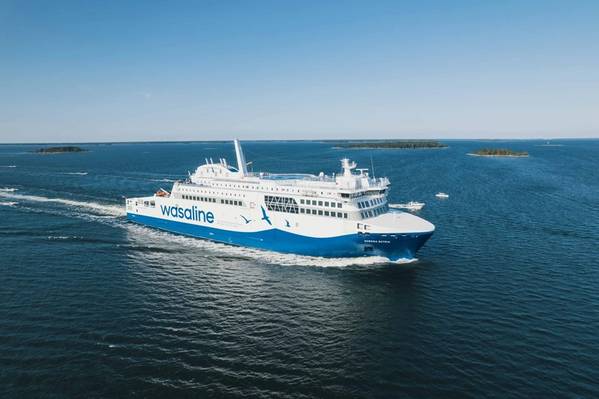
Wasaline says it has become the first carbon-neutral shipping company in the Baltic Sea, reaching its original 2030 climate target six years ahead of schedule. The milestone comes as the Finnish-Swedish operator signed a biogas supply contract with Gasum and entered a FuelEU Maritime pooling agreement with Stena Line, enabling its Vaasa–Umeå service to run entirely on biofuels.
The agreement makes the route the first international green shipping corridor in operation, an achievement supported by the DNV-led Nordic Roadmap. Wasaline’s flagship Aurora Botnia, a hybrid RoPax ferry already equipped with dual-fuel engines and batteries, will see its battery capacity expanded to 12.6 MWh by January 2026 through a collaboration with AYK Energy, Foreship, and Wärtsilä, making it the largest battery installation on a RoPax vessel worldwide.
Rather than focusing on exemptions from the EU Emissions Trading System, Wasaline Managing Director Peter Ståhlberg said the company chose to treat regulatory changes as a business opportunity. “With this unique collaboration with Stena Line and Gasum, Wasaline can achieve carbon neutrality already now as a forerunner for the industry,” he said, noting that cargo and passengers will incur no extra charge for the carbon-neutral service.
Industry partners hailed the initiative’s wider significance. DNV’s Segment Director for RoRo and Ferries, Vegar Rype, called the Vaasa–Umeå service “the first international green shipping corridor in operation,” aligning with the Clydebank Declaration and Nordic zero-emission shipping goals. Stena Line CEO Niclas Mårtensson highlighted that integrating Aurora Botnia into Stena’s FuelEU Maritime pool expands access to scarce biogas supplies, further lowering emissions and strengthening competitiveness. Gasum Vice President for Maritime Jacob Granqvist emphasized renewable biogas as an “already available, concrete solution” for maritime emission reduction, with plans to expand supply in coming years.
Wasaline operates the northernmost shipping route in the world, transporting passengers and freight daily between Finland and Sweden, playing a key role in regional supply security. Stena Line, one of Europe’s leading ferry companies, runs about 25,700 sailings annually across 20 routes in Northern Europe and the Mediterranean. Gasum, a Nordic energy market specialist, focuses on cleaner fuels and energy services, while DNV remains the world’s leading classification society, advising on safety, efficiency, and environmental performance across global shipping
TECH SPOTLIGHT: Aurora Botnia’s Hybrid Propulsion System
Aurora Botnia, Wasaline’s flagship, represents one of the most advanced hybrid propulsion applications in the RoPax sector. Delivered in 2021, the vessel combines dual-fuel Wärtsilä 31DF engines, capable of running on LNG, LBG (liquefied biogas), and conventional marine fuels, with a large-scale battery energy storage system (BESS).
Initially fitted with a 2.4 MWh battery system, Aurora Botnia’s storage was upgraded to 10.4 MWh earlier this year. A new conversion project, scheduled for completion in January 2026 in partnership with AYK Energy, Foreship, and Wärtsilä, will push total capacity to 12.6 MWh—the largest battery installation on any RoPax vessel globally.
The hybrid configuration enables flexible power management:
In daily operation, the vessel will run on certified renewable biogas supplied by Gasum, switching between fuel and battery modes via Wärtsilä’s integrated energy management system. This combination maximizes energy efficiency and allows Aurora Botnia to meet—and exceed—current and upcoming FuelEU Maritime requirements.




